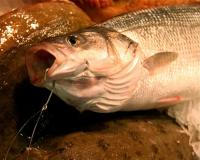Researchers continue to demonstrate that fish "feel" pain
 CC photo by in Praise of Sardines/flickr
CC photo by in Praise of Sardines/flickr
Recent European studies explore fish cognition as well as pain.
When a fish is hooked and it fights being hauled into your boat, it’s not just playing with you. It’s more likely reacting to pain and trying to escape it, according to a stream of published research on fish physiology.
Several studies by researchers in Europe and the United States have found that when fish were exposed to pain in their mouth, gills and heads, pain signals are sent to the same region of the brain where birds and mammals process pain.
The study of animal neurobiology, cognition and behavior is still a relatively new field, but some of the research being published by animal biologists and neuroanatomists is of concern to animal rights activists interested in the humane treatment of other mammals, fish and birds.
In an article published last month in Spiegel International, author Günther Stockinger wrote:
“Researchers from Queen's University, in Belfast, have proven that when fish are subjected to pain stimuli, the signals by no means simply ebb away in the spinal cord. Scientists have discovered sensitive skin areas directly behind the gill covers of goldfish and trout. Using implanted electrodes, they have been able to show that the nerve cells located there send signals directly to the fish's brain.
“When researchers poked the animals with needles, a flurry of neuron messages were transmitted to the endbrain -- the very region of the brain where pain signals are also processed by birds and mammals.”
Sport fishermen and other researchers, including zoologist James Rose, have dismissed the fish and pain research as anthropomorphism. While fish might react to pain, they don’t have the neurological ability to mentally process pain like humans do, say detractors. In other words, while fish react to pain, they don’t experience it the same way.
In a paper published in Reviews in Fisheries Science, Rose wrote:
“The literature on the neural basis of consciousness and of pain is reviewed, showing that: 1) behavioral responses to noxious stimuli are separate from the psychological experience of pain, (2) awareness of pain in humans depends on functions of specific regions of cerebral cortex, and (3) fishes lack these essential brain regions or any functional equivalent, making it untenable that they can experience pain.”
Free From Harm -- an international organization focused on helping people understand how global food choices impact climate change, environmental degradation, poverty and animal suffering -- believes the studies are important. "We shouldn't be surprised that the scientific study of animals is proving more and more that animals have far greater cognitive ability than we ever understood,” according to the group. “Since animals suffer mostly in silence and even hide their pain, this is not a surprising discovery."
So far, the research into fish and pain has included only goldfish, trout, carp and zebra fish. That’s too limited to conclude that all fish species feel or react to pain the same way, according to an EU panel that is reviewing the research.
For the obvious reason, (we're not fish!) we’ll never know exactly how fish process pain. It’s precisely because we can’t know that gentle and respectful handling of a caught fish, part of our circle of life, is always in order.



 del.icio.us
del.icio.us Digg
Digg












Post your comment